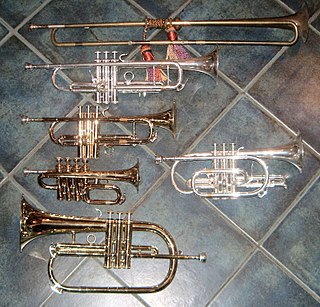
A brass instrument is a musical instrument that produces sound by sympathetic vibration of air in a tubular resonator in sympathy with the vibration of the player's lips. Brass instruments are also called labrosones or labrophones, from Latin and Greek elements meaning 'lip' and 'sound'.

The euphonium is a medium-sized, 3 or 4-valve, often compensating, conical-bore, tenor-voiced brass instrument that derives its name from the Ancient Greek word εὔφωνος euphōnos, meaning "well-sounding" or "sweet-voiced". The euphonium is a valved instrument. Nearly all current models have piston valves, though some models with rotary valves do exist.

The saxhorn is a family of valved brass instruments that have conical bores and deep cup-shaped mouthpieces. The saxhorn family was developed by Adolphe Sax, who is also known for creating the saxophone family. The sound of the saxhorn has a characteristic mellow tone quality and blends well with other brass.
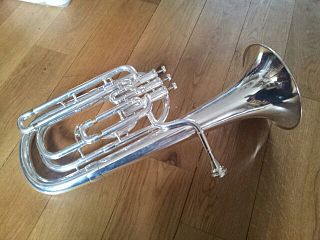
The baritone horn, or sometimes just called baritone, is a low-pitched brass instrument in the saxhorn family. It is a piston-valve brass instrument with a bore that is mostly conical but it has a narrower bore than the similarly pitched euphonium. It uses a wide-rimmed cup mouthpiece like that of its peers, the trombone and euphonium. Like the trombone and the euphonium, the baritone horn can be considered either a transposing or non-transposing instrument.
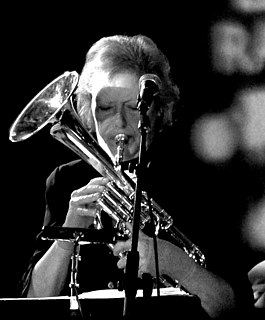
The tenor horn is a brass instrument in the saxhorn family and is usually pitched in E♭. It has a bore that is mostly conical, like the flugelhorn and euphonium, and normally uses a deep, cornet-like mouthpiece.

A concert band, variously also called a wind ensemble, symphonic band, wind symphony, wind orchestra, wind band, symphonic winds, symphony band, or symphonic wind ensemble, is a performing ensemble consisting of members of the woodwind, brass, and percussion families of instruments, and occasionally including the harp and the double bass or bass guitar. On rare occasions, additional non-traditional instruments may be added to such ensembles such as piano, synthesizer, or electric guitar.
In Britain, a brass band is a musical ensemble comprising a standardized range of brass and percussion instruments. The modern form of the brass band in the United Kingdom dates back to the 19th century, with a vibrant tradition of competition based around communities and local industry, with colliery bands being particularly notable. The Stalybridge Old Band was formed in 1809 and was perhaps the first civilian brass band in the world.

Marching brass instruments are brass instruments specially designed to be played while moving. Most instruments do not have a marching version - only the following have marching versions:

A brass band is a musical ensemble generally consisting entirely of brass instruments, most often with a percussion section. Ensembles that include brass and woodwind instruments can in certain traditions also be termed brass bands, but may more correctly termed military bands, concert bands, or "brass and reed" bands.
"The Floral Dance" is an English song describing the annual Furry Dance in Helston, Cornwall.

The euphonium repertoire consists of solo literature and parts in band or, less commonly, orchestral music written for the euphonium. Since its invention in 1843, the euphonium has always had an important role in ensembles, but solo literature was slow to appear, consisting of only a handful of lighter solos until the 1960s. Since then, however, the breadth and depth of the solo euphonium repertoire has increased dramatically.
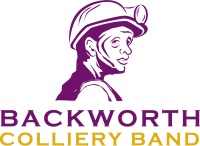
Backworth Colliery Band are a traditional British Brass Band based in Backworth, Newcastle-upon-Tyne, England. The band consist of 27 senior members and 15 junior members, all of whom play brass or percussion instruments fitting the traditional brass band instrumentation.
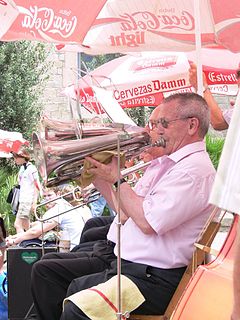
A fiscorn is a brass instrument. It is a bass flugelhorn in the key of C. In the cobla, it has the deepest sound among the brass instruments.
The Vernon Building Society (Poynton) Brass Band is a brass band from Poynton in Cheshire, England. As one of the North-West's premiere brass bands, Vernon Building Society (Poynton) Band is well known for its original and entertaining concert programmes, as well as being a prize-winner at contests throughout the country.
Adriana Hölszky is a Romanian-born German music educator, composer and pianist who has been living in Germany since 1976.

Callender's Cableworks Band was an amateur brass band made up of members employed by and under the patronage of Erith Works at the Callender Cable & Construction Co. Ltd, later British Insulated Callender's Cables, in Belvedere, Kent, and performing in London and south-east England. They were prolific broadcasters in the early years of BBC Radio, and won 25 brass band competitions.
The Tanunda Town Band is an A-Grade Brass band, located in Tanunda, South Australia. The band is recognised as the oldest continuing brass band in the Southern hemisphere, having been established in 1857.
The North American Brass Band Association (NABBA) is among the organizations whose goal is to promote the British brass band in North America.
The Stanshawe Band was a brass band in the English City of Bristol.












